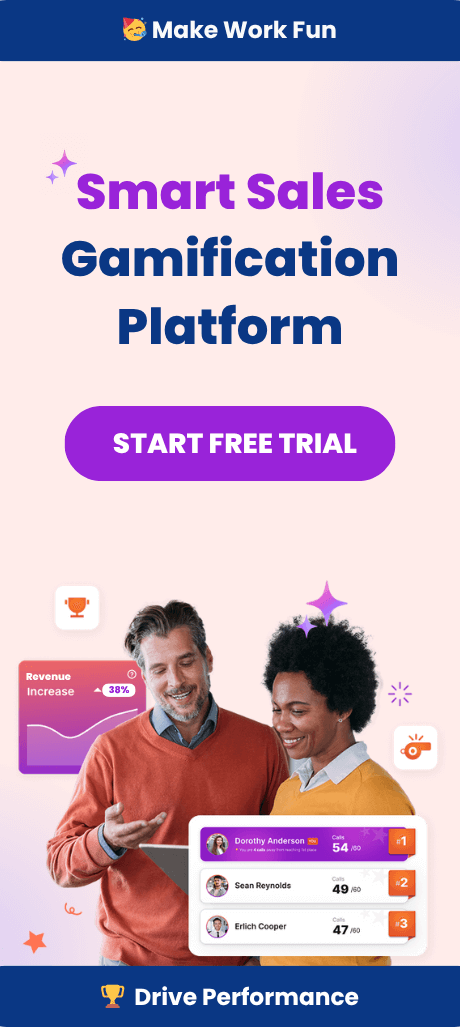Introduction
AI is transforming sales by automating repetitive tasks and enabling deeper personalization in customer interactions. Businesses today must strike a balance between efficiency and human connection to optimize sales performance. While automation streamlines processes, personalization fosters stronger relationships with customers.
Spinify, a leader in AI-driven performance coaching and gamification, helps sales teams navigate this balance by providing real-time insights, automated goal tracking, and AI-powered coaching. This guide explores the benefits of AI in sales automation and personalization, helping businesses find the best approach to drive success.
The Rise of AI in Sales
AI has rapidly become a vital asset in modern sales, transforming how teams automate tasks, analyze data, and deliver personalized customer experiences. Leading companies like Salesforce and HubSpot utilize AI to enhance CRM functionalities and streamline sales workflows, allowing sales teams to focus on high-value activities. By automating repetitive tasks, AI enables sales reps to devote more time to building personal relationships with potential buyers, ultimately boosting conversions.
Beyond automation, AI significantly enhances personalization in sales. By analyzing customer data points and predicting behaviors, AI tools enable sales teams to tailor interactions to individual customer needs. This level of personalization fosters customer retention and loyalty, as it makes customers feel valued and understood. AI-driven platforms like Drift and Conversica empower sales teams to craft personalized messaging and recommendations, leading to increased engagement and improved conversion rates. As AI continues to evolve, its role in sales processes is expected to expand, offering even more advanced tools for businesses to leverage in their pursuit of success.
Sales Automation: What It Means for Businesses

Sales automation leverages AI and advanced software to handle repetitive tasks, freeing up valuable time for sales teams to concentrate on high-value activities. By automating processes such as lead scoring, follow-ups, and reporting, platforms like Outreach and Salesloft enhance operational efficiency. This allows sales reps to focus on building personal relationships with potential customers, ultimately boosting conversions and driving revenue growth. Automation not only streamlines the sales process but also ensures consistency and accuracy in managing customer interactions and data.
Furthermore, sales automation tools empower businesses to scale their operations without compromising on quality. By integrating AI-driven technologies, companies can manage larger volumes of sales leads and customer interactions with ease, while still delivering a personalized experience. Automation also facilitates better alignment between marketing and sales teams, as it provides insights and analytics that inform strategic decision-making. As a result, businesses can optimize their sales funnels, improve conversion rates, and enhance customer retention, all while maintaining a strong focus on personal relationships and customer satisfaction.
The Power of Personalization in Sales
Personalization in sales is a powerful strategy that tailors interactions to meet the unique needs of each individual customer. AI-driven tools like Drift and Conversica enable sales teams to craft personalized messaging and recommendations that resonate with potential buyers. This approach enhances customer engagement and significantly boosts conversion rates. By analyzing customer data, sales reps gain insights into preferences and behaviors, allowing them to deliver experiences that make customers feel valued and understood, fostering loyalty and driving repeat business.
Beyond customized messaging, personalization involves creating a tailored customer journey from initial contact to final sale and beyond. AI tools help sales teams identify effective strategies for engaging different customer segments, ensuring each interaction adds value to the customer relationship. By focusing on personalization, businesses can build stronger personal relationships with customers, improving satisfaction and enhancing brand reputation. In today’s market, leveraging AI for personalization is essential for achieving sustained success.
How AI Balances Automation and Personalization
AI bridges the gap by automating data collection and analysis while providing insights for personalized outreach. Spinify’s AI Coaching Agent ensures that sales reps receive real-time feedback and data-driven coaching.
In today’s competitive market, leveraging AI to balance automation and personalization is crucial for businesses aiming to enhance their sales processes. Automation streamlines repetitive tasks, allowing sales teams to focus on nurturing customer relationships. AI tools analyze customer data, providing valuable insights that help tailor interactions to individual customer needs, ultimately boosting customer satisfaction and loyalty. By integrating AI, companies can efficiently manage large volumes of customer interactions while still delivering a personalized experience, ensuring each customer feels valued and understood.
The Role of AI in Lead Scoring and Qualification
AI-driven lead scoring prioritizes prospects based on engagement and likelihood to convert. Platforms like ZoomInfo and Gong use predictive analytics to refine lead qualification processes.
AI’s role in lead scoring and qualification is transformative, enabling sales teams to focus their efforts on high-potential prospects. By analyzing vast amounts of data, AI can identify patterns and predict which leads are most likely to convert, allowing sales reps to allocate their time and resources effectively. This not only improves conversion rates but also enhances the overall efficiency of the sales process. AI’s ability to continuously learn and adapt ensures that lead scoring models remain accurate and relevant, providing businesses with a competitive edge in identifying and pursuing the best opportunities.
Automating Sales Outreach Without Losing the Human Touch
Email automation and chatbots streamline outreach but must be used strategically to maintain authenticity. AI-powered tools like ChatGPT and Spinify’s AI Coaching Agent enhance outreach by refining messaging and engagement strategies.

While automation is essential for scaling outreach efforts, maintaining the human touch is critical for building personal relationships with potential customers. AI tools can help craft personalized messages that resonate with individual customers, ensuring that automated interactions feel genuine and engaging. By leveraging AI to analyze customer behavior and preferences, businesses can tailor their outreach strategies to align with customer expectations, fostering trust and loyalty. This approach not only improves engagement rates but also strengthens the overall customer experience, driving long-term success and repeat business.
AI-Powered Sales Coaching and Training
Continuous learning is key to sales success. Spinify’s AI Coaching Agent analyzes performance data and delivers personalized coaching to help reps refine their approach and close more deals. By leveraging AI-powered coaching, sales teams can identify areas for improvement and receive targeted training that enhances their skills and effectiveness. This personalized approach to coaching ensures that each sales rep can develop their unique talents, leading to increased confidence and better performance in the field. Moreover, AI-driven coaching platforms can adapt to changing market conditions and sales strategies, providing up-to-date guidance that keeps sales teams ahead of the competition.
Real-Time Performance Tracking with AI
Tracking sales performance in real-time helps teams make data-driven decisions. Spinify’s AI-powered dashboards provide insights into individual and team progress, keeping sales professionals motivated. Real-time tracking not only highlights achievements but also identifies potential challenges before they impact sales outcomes. With instant access to performance metrics, sales managers can quickly adjust strategies, allocate resources more effectively, and provide timely support to their teams. This proactive approach ensures that sales teams remain agile and responsive, ultimately driving better results and higher revenue.
Personalizing Customer Interactions with AI Insights
AI is transforming how businesses personalize customer interactions by providing deep insights into customer behavior and preferences. Tools like 6sense and Clearbit analyze data points to enable sales teams to tailor their strategies effectively. This allows sales reps to create personalized messages and offers that resonate with potential buyers, enhancing customer engagement and fostering stronger relationships. By anticipating customer needs and preferences, AI-driven personalization leads to increased loyalty and repeat business.
Beyond messaging, AI insights help shape a tailored customer journey from initial contact to final sale. By optimizing sales processes with AI, businesses can ensure each interaction adds value and aligns with customer expectations. This approach not only boosts conversion rates but also enhances overall customer satisfaction, giving companies a competitive edge. As AI technology evolves, its role in delivering personalized experiences will become even more integral to successful sales strategies.
The Benefits of AI-Driven Sales Forecasting
AI-driven sales forecasting empowers sales teams to anticipate customer needs and optimize sales pipelines through predictive analytics. By analyzing historical data and market trends, AI tools allow sales managers to make informed decisions on resource allocation and strategy adjustments, staying ahead of the competition. Real-time insights from platforms like Spinify enable quick strategy refinement, aligning with changing customer preferences and market dynamics. This adaptability enhances forecast accuracy and agility in sales processes, allowing businesses to focus on high-impact activities that drive revenue and efficiency. Ultimately, AI-driven forecasting supports data-driven decisions that boost customer satisfaction, repeat business, and long-term success.
Gamification and AI: A Winning Combination for Sales Teams
Gamification, when combined with AI, creates a dynamic environment that enhances motivation and drives performance among sales teams. By integrating AI-driven insights with gamification strategies, platforms like Spinify offer a unique approach to sales engagement. Sales reps are motivated through rewards and recognition for achieving performance milestones, which not only boosts morale but also fosters a culture of healthy competition. AI analyzes individual and team performance data, providing real-time feedback and personalized coaching that helps reps improve their skills and achieve their goals. This combination of AI and gamification ensures that sales teams remain focused, motivated, and aligned with business objectives.
Moreover, gamification and AI together transform sales processes by making them more interactive and engaging. Sales reps can track their progress against peers, set personal benchmarks, and celebrate achievements, all while receiving AI-powered insights that guide their development. This approach not only enhances individual performance but also strengthens team cohesion, as members work collaboratively to achieve common goals. By leveraging AI to personalize the gamification experience, businesses can ensure that each sales rep receives the support and motivation they need to succeed. Ultimately, this winning combination leads to increased productivity, higher conversion rates, and a more vibrant sales culture.
The Role of AI in Sales Enablement
AI-driven sales enablement tools are revolutionizing the way sales teams operate by providing on-demand access to tailored content, training modules, and strategic playbooks. Platforms like Seismic and Highspot leverage AI to analyze customer data and sales interactions, delivering personalized content recommendations that align with the needs of individual sales reps and their potential buyers. This targeted approach not only enhances the effectiveness of sales pitches but also ensures that sales teams are equipped with the most relevant information to address customer inquiries and objections. By automating the process of content delivery, AI-driven tools free up valuable time for sales reps, allowing them to focus on building personal relationships with clients and nurturing leads through the sales funnel.
Moreover, AI in sales enablement extends beyond content recommendations to include comprehensive training and development opportunities. By utilizing machine learning algorithms, these platforms can identify skill gaps and provide tailored training modules that help sales reps improve their techniques and stay updated with industry trends. AI-powered playbooks offer strategic guidance, enabling sales teams to adapt their approaches based on real-time insights and market dynamics. This continuous learning and adaptation process not only boosts individual performance but also contributes to the overall success of the sales team. As AI continues to evolve, its role in sales enablement will become increasingly integral, providing businesses with the tools they need to optimize sales processes, enhance customer interactions, and drive revenue growth.
AI and CRM Integration for Seamless Sales Workflows
Integrating AI with CRM platforms like Salesforce and HubSpot revolutionizes sales workflows by automating repetitive tasks such as data entry and lead scoring, allowing sales reps to focus on nurturing personal relationships with potential buyers. This integration ensures accurate, up-to-date customer data and provides insights into customer behavior, enabling more effective strategies to boost conversions. AI tools predict customer needs, allowing for personalized interactions that strengthen relationships and enhance loyalty. Additionally, Spinify enriches CRM insights with AI-powered performance tracking and gamification, motivating teams with real-time feedback and recognition. As AI continues to advance, its role in CRM integration will be crucial for enhancing sales processes and driving business success.

Enhancing Team Collaboration with AI-Powered Communication
AI enhances team collaboration by streamlining communication and providing real-time insights that empower sales teams to work more effectively together. By automating routine reporting tasks, AI frees up time for sales reps to focus on strategic discussions and decision-making, fostering a more cohesive team environment. Spinify takes collaboration a step further by integrating gamification into team performance and goal achievement, encouraging friendly competition and shared success. This approach not only boosts morale but also aligns team efforts towards common objectives, ultimately driving better results and fostering a culture of continuous improvement. As AI continues to evolve, its role in facilitating seamless communication and collaboration will become even more integral to the success of sales teams.
Measuring Sales Success: Automation vs. Personalization
In today’s dynamic sales landscape, measuring the success of automation and personalization strategies is crucial for businesses aiming to optimize their sales processes. Automation streamlines repetitive tasks, allowing sales teams to focus on high-value activities such as building personal relationships with potential buyers. By tracking metrics like conversion rates, time saved, and efficiency improvements, companies can assess the impact of automation on their operations. AI-driven analytics, such as those offered by Spinify, provide valuable insights into how automation enhances productivity, enabling businesses to make data-driven decisions that refine their sales strategies. This ensures that automation efforts are aligned with company goals and deliver tangible results.
On the other hand, personalization plays a vital role in fostering customer loyalty and driving repeat business. By leveraging AI tools to analyze customer data, sales teams can tailor interactions to meet the unique needs and preferences of individual customers. Measuring the effectiveness of personalization involves tracking customer engagement levels, satisfaction scores, and the overall impact on customer retention. Spinify’s AI-driven analytics help businesses evaluate these metrics, offering a comprehensive view of how personalization efforts contribute to sales success. By balancing automation and personalization, companies can create a sales strategy that not only boosts conversions but also enhances customer relationships, ultimately leading to sustained growth and success.
Finding the Right Balance: AI as a Sales Co-Pilot
AI should support—not replace—human sales interactions. By combining automation for efficiency and AI-driven insights for personalization, businesses can create a well-rounded sales strategy that maximizes success. This harmonious integration allows sales teams to automate repetitive tasks, freeing up time to focus on nurturing personal relationships with potential buyers. AI tools provide valuable insights into customer behavior and preferences, enabling sales reps to tailor their approach to each individual customer, ultimately enhancing customer experience and boosting conversion rates. By leveraging both automation and personalization, companies can optimize their sales processes, improve customer retention, and achieve sustainable growth in an increasingly competitive market.
Leverage Spinify to Optimize AI in Sales
AI is revolutionizing sales by streamlining automation and enhancing personalization. Finding the right balance is key to driving success. Spinify’s AI Coaching Agent and gamification tools empower sales teams with real-time feedback, motivation, and data-driven coaching.
Want to optimize AI in your sales strategy?
👉 Book a demo with Spinify today and see how AI-powered performance coaching can transform your sales team!




